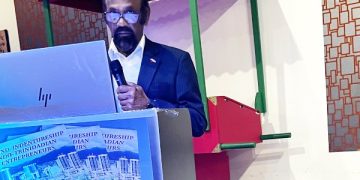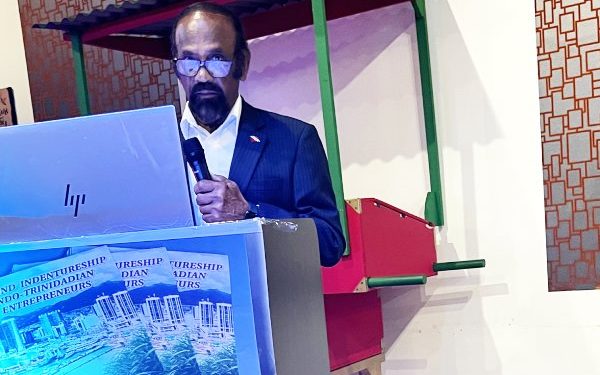Retired Trinidad and Tobago’s Ambassador Chandradatt Singh delivered the featured address of the launch of Hemraj Ramdath’s book “Beyond Indentureship: Indo Trinidadian Entrepreneurs” held on evening of June 29 at Singh’s Roti Shop restaurant in Ft Lauderdale. Ambassador Singh said the launch of the book follows closely on the recent celebrations of 178 years of the arrival of Indian Indentured Workers to Trinidad.
He stated: “On that day, May 30th, which is now a National holiday in Trinidad and Tobago, there were several events marking the occasion which paid tribute to the 225 Indians who arrived on the Fateh Al Razak in 1845 and those who were subsequently brought to the Island until 1917. The question is: what are we really celebrating on Indian Arrival Day? Part of the answer to this question is effectively detailed in Hemraj’s book dealing with Indo-Trinidadian Entrepreneurs.
Rising from the ashes of burnt sugar cane fields, these Indian labourers did not buckle under the trials and tribulations of plantation life; instead, the refreshed their Jahaji Bundles and marched towards a new horizon. They were equipped with their inherent values of hard work, thrift, strong family ties and reverence to Dharti Mata, the land of their new home.
This book is well researched and written in a simple style. It captures the experiences and progress of some of the outstanding Girmitia families who rose from poverty to prosperity and from illiteracy to enlightenment in the field of business. The book also throws light on the long years of toil, sacrifice and business acumen invested by them to build several monuments in Trinidad including landmark homes that stand today as testimonies of their resilience and success. It should not be forgotten that these families came from barracks, mud huts and cow sheds.
Penny by Penny and brick by brick they built monuments to be admired rather than being objects of envy and hate by those who do not understand the true stories behind the success of the post Indian immigrant community. Hemraj’s book provides glimpses of that history which will hopefully help to educate and generate greater tolerance in Trinidad and Tobago’s multiethnic community. I hope that someone will follow Hemraj’s lead and publish an account of the accomplishments of our post emancipation afro brothers and sisters who also rose from the dehumanizing system of slavery to reach great heights in our country.
This book lists the different categories of business which the freed Indentured Indians pursued including cocoa, coffee, dairy and other agricultural items. They continued to cultivate sugar cane with great success. When you read this book, you will be fascinated by the story behind the humble beginning and remarkable growth of some of the giant companies owned by these entrepreneurs. They moved beyond the boundaries of the sugar cane estates and established manufacturing and other forms of economic activities throughout the Island. It should be noted that, at that time, little or none of this was based directly on the oil industry. If only post-Independence governments of Trinidad and Tobago provided incentives and the right level of support to these early entrepreneurs, the solid economic base that they helped to build would have placed us in a better economic position today rather than the economics of self-destruction upon which we seem to be travelling.
In conclusion, I would like to draw your attention to the last paragraph of the introduction in this book which states that the freed Indentured workers “…….created a distinct space for themselves within the society but at the same time they have interacted with other ethnic groups to add a distinct cultural and economic flavor which is unique to Trinidad and Tobago.
Thank you Hemraj and congratulations on writing this much needed book”.


































































